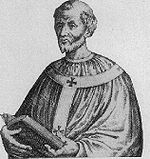Pope Alexander IV
Pope Alexander IV | |
|---|---|
 | |
| Papacy began | December 12, 1254 |
| Papacy ended | May 25, 1261 |
| Predecessor | Innocent IV |
| Successor | Urban IV |
| Personal details | |
| Born | Rinaldo di Jenne 1199 or c. 1185 |
| Died | May 25, 1261 Viterbo, Italy |
| Other popes named Alexander | |
| Papal styles of Pope Alexander IV | |
|---|---|
 | |
| Reference style | His Holiness |
| Spoken style | Your Holiness |
| Religious style | Holy Father |
| Posthumous style | None |
Pope Alexander IV (1199 or ca. 1185 – May 25, 1261) was Pope from 1254 until his death.
Born as Rinaldo di Jenne, in Jenne (now in the Province of Rome), he was, on his mother's side, a member of the de' Conti di Segni family, the counts of Segni, like Pope Innocent III (1198–1216) and Pope Gregory IX (1227–41). His uncle, Pope Gregory IX made him cardinal deacon and Protector of the Order of Franciscans in 1227, Camerlengo of the Holy Roman Church from 1227 until 1231 and Bishop of Ostia in 1231 (or 1232). He became Dean of the Sacred College of Cardinals in 1244 (or in 1240). On the death of Pope Innocent IV (1243–54) he was elected Pope at Naples on December 12, 1254.
Alexander IV succeeded Innocent IV as guardian of Conradin, the last of the Hohenstaufens, promising him protection; but in less than a fortnight he conspired against him and bitterly opposed Conradin's uncle Manfred. [citation needed] Alexander IV threatened excommunication and interdict against the party of Manfred, without effect. Nor could he enlist the Kings of England and Norway in a crusade against the Hohenstaufens. Rome itself became too Ghibelline for the Pope, who withdrew to Viterbo, where he died in 1261. He was buried in Viterbo Cathedral, but his tomb was destroyed during sixteenth century renovations.
His pontificate was signaled by efforts to re-unite the Eastern Orthodox churches with the Catholic Church, by the establishment of the Inquisition in France, by favours shown to the mendicant orders, and by an attempt to organize a crusade against the Tatars after the second raid against Poland in 1259.
On April 12, 1261, shortly before his death, he issued a papal bull for Henry III of England, absolving Henry of oaths taken in the Provisions of Oxford, which was instrumental in the Second Barons' War.[1]
References
- ^ Harding, Alan. England in the Thirteenth Century. Cambridge University Press. p. 290.
 "Pope Alexander IV" in the 1913 Catholic Encyclopedia.
"Pope Alexander IV" in the 1913 Catholic Encyclopedia.- Richard, Jean (1999). The Crusades: c. 1071 – c. 1291. Cambridge University Press. ISBN 978-0-521-62566-1.
- Harding, Alan. England in the Thirteenth Century. Cambridge University Press. p. 290.
- This article incorporates text from a publication now in the public domain: Chisholm, Hugh, ed. (1911). Encyclopædia Britannica (11th ed.). Cambridge University Press.
{{cite encyclopedia}}: Missing or empty|title=(help)
See also
- 12th-century births
- 1261 deaths
- People from the Province of Rome
- Cardinal-nephews
- Deans of the College of Cardinals
- Cardinal-bishops of Ostia
- Italian popes
- Popes
- 13th-century Roman Catholic bishops
- 13th-century Italian people
- Camerlengos of the Holy Roman Church
- Viterbo Papacy
- Christians of the Prussian Crusade
